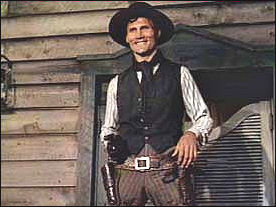Sometimes you can just smell the readiness in a critic or a columnist to take a film down. They can’t do this, of course, unless the film “cooperates” — i.e., is at least a little bit bad — but you can always sense an itchy trigger finger. Good critics and columnists always try to be receptive to whatever moves and grooves a movie has to offer, but you can always tell when they’ve strapped on their belts and are twirling their pistols and waiting, just waiting. Ask any publicist.

A professional always keeps ’em holstered unless there’s no choice, but there’s something in human nature that can’t help savoring the action before it happens, and I mean “if” and “when.”
I knew for a fact that several Crash and Paul Haggis haters out there were ready to draw on In The Valley of Elah last summer, and the obliging Haggis gave them just enough reason to pull (i.e., the flag at the end, the Annie Lennox song) and they all opened up.
I’ll admit I’ve been looking to draw on Tim Burton‘s Sweeney Todd, in part because I’ve been down on Burton for years and partly because David Poland said five or six months ago that Johnny Deep was a preemptive Best Actor contender, but Stephen Sondheim changed all that when he told Roger Friedman that the film is relatively short and that “it’s not the stage musical.” Now, who knows?
And when you read Jeremy Smith‘s 10.2.07 CHUD piece you can just tell that he and Poland are out there on Boot Hill’s Main Street, kicking at the dust and ready to pull if provoked. They can taste the action like like a hungry suburbanite can taste the burgers sizzling on the grill at a backyard barbecue.
Why anyone would be out to get Paul Thomas Anderson is beyond me. And of course, Smith and Poland may both say I’m full of shit and that they have no such notion. But talk to any filmmaker who knows the lay of the land, and they’ll tell you exactly which critics have always been out to get them. A lot of directors have said this to me over the years, and they’re not all crazy. Directors don’t get to be directors without knowing something about human nature.









